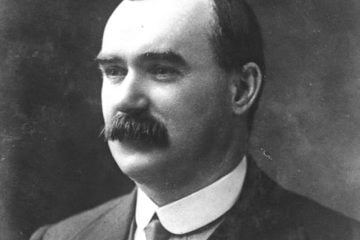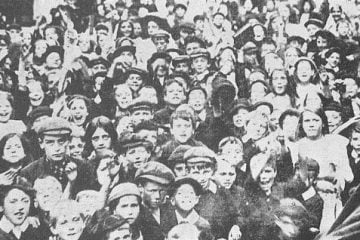Working people all over the world are realising, in greater and greater numbers, that they are exploited. In Britain, Russell Brand and UKIP offer radically different explanations for the situation people have found themselves in since the onset of the global capitalist crisis. But Brand’s confused revolution rhetoric, although engaging, is not enough on its own. Che Guevara was wrong to say that the apple of revolution will not fall by itself – the truth is that civil unrest will inevitably erupt as the frustrations of ordinary people find an expression. Revolutions happen whether Marxists exist or not, just as gravity works whether there are scientists to measure it or not. But that does not necessarily mean that there will inevtiably be a successful revolution. That is down to us. We need to build a viable anti-capitalist organisation now, to fight for an alternative system; to be ready to implement a clear programme; and thereby to avoid the chaos that accompanies revolution without leadership.
The upcoming general election offers us a choice between the crippling austerity of the Conservatives and the slightly-less-crippling austerity of Labour. Capitalism is in crisis and substantial change is not possible until the whole system is replaced. Just as Hollande’s promises of an end to austerity for France never came to fruition, Britain’s well-intentioned Green party offer what can, unfortunately, only be described as a pipe dream of policies which cannot be afforded so long as capitalism exists for the benefit the few at the expense of the many.
We are not all in this together. The Conservatives have only implemented 40% of their planned spending cuts, whilst Shadow Chancellor Ed Balls has said that a Labour government after the election would also be committed to cuts. The austerity politics advocated by both parties has led to living standards falling hardest and fastest since records began in the 1870s. At the other end of the economic spectrum, the richest 1,000 Britons have now amassed £519 billion; a 15% increase on last year’s figure. Britain has more billionaires per head than any other G8 country, yet 1 in 20 families in Britain cannot afford to feed their children adequately. However, what piecemeal reform is possible under capitalism cannot effectively redistribute wealth, since any attempts to increase tax on the rich would result in a flight of capital as businesses relocate to countries where there is more profit to be made. It is estimated that by the end of this year, the richest 1% will own as much wealth as the rest of the 99%. This is the reality of capitalism, and it is abhorrent.
Inequality between rich and poor can also be seen in the supposedly impartial judicial process. Following the 2011 UK riots, courts were opened through the night to process those involved. David Cameron, speaking as an alumnus of Oxford University’s Bullingdon club – infamous for its members vandalising restaurants and college spaces, defended the harsh punishment of rioters. He called the actions of those involved ‘criminality pure and simple’. One looter faced deportation for stealing an ice cream, and another was given a 6 month custodial sentence for stealing £3.50 worth of bottled water. In contrast, MPs involved in the expenses scandal were allowed to voluntarily repay the money they stole, and most avoided the judicial system altogether. Most recently, 46 MPs have been found claiming expenses for renting properties in London whilst at the same time letting out their nearby properties.
Begging is illegal and anti-homeless spikes are installed in doorways. Labour are considering building on the green belt to address the housing crisis, whilst 650,000 empty homes exist alongside homelessness. But capitalism is not concerned with human well-being, only profit. The amount of money America has spent developing a military jet which does not yet work properly would have been enough to provide every homeless person in America with a $600,000 house. Globally, poverty causes 22,000 children under the age of 5 to die each day. At the same time, the wealth of the 15 richest people has increased 11.6% in the last year – now totalling $426 billion. We have mass starvation while America throws away a third of the food it produces each year. In the UK, Tesco supermarket admits to throwing away 30,000 tonnes of food in the first six months of 2013, while those who take food from supermarket bins face prosecution for theft. There are enough resources to provide everyone with what they need, but the wastefulness of capitalism puts profit before people.
Production for profit is also an economic problem as well as a moral one, since workers as a class can never afford to buy the sum total of what they produce. Marx explained that this contradiction leads inevitably to a crisis of overproduction, and it is a contradiction which intensifies as workers are replaced with machines which cannot then consume the products they are producing. In other words, bosses pay workers as little as possible and mechanise production to reduce costs, while at the same time relying on workers being able to afford to buy back the goods they produce. Huge numbers of commodities are therefore produced which cannot be sold. The use of credit has been a way of artificially increasing the amount that ordinary people can afford to buy, but this reached breaking point in 2008 with the economic collapse.
We are in the seventh year of the crisis and are told by both the Conservatives and Labour that spending cuts are needed for economic recovery. But even when these cuts have plunged countless families into poverty and led to the meltdown of essential services like the NHS, economic growth has been miniscule and remains vulnerable to world events. We are supposed to be grateful for our jobs working on zero-hour contracts for pitiful wages because we are lucky to have a job at all. If we complain, there will always be someone else ready to step in and take over from us. Fear that things could be worse keeps us obedient until the undercurrents of anger finally boil over as civil unrest.
Just as the emergence from feudalism, via the bourgeois revolutions such as the French revolution, was a step into the unknown, moving from capitalism to socialism is a big step, but a necessary one if human and environmental needs are to be satisfied.
The capitalist system is rotten to the core and the apple of revolution will fall regardless of whether a Marxist organisation exists to give it direction. To really solve our problems we need to fight for a planned socialist economy which produces in order to satisfy the needs of the many rather than the greed of the few. Global revolution – the expropriation of the banks and placing the means of production under control of workers, is the only way to escape austerity politics. It is time for a system which works for the many rather than the few.
Leon Trotsky, the great Russian revolutionary, explained the role of a revolutionary organisation. He said it is like a piston box in an engine, directing the steam and converting it into useful work. The Marxist Student Federation, as it grows, can play a role like this among students and workers: turning the anger that exists in society into a revolutionary movement that can transform society.
by Sam Miller, Cambridge Marxists



